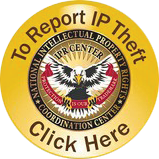INTELLECTUAL PROPERTY RIGHTS ARE A PRIORITY TRADE ISSUE
What’s a Priority Trade Issue (PTI)?
PTIs represent high-risk areas that can cause significant revenue
loss, harm the U.S. economy, or threaten the health and safety of the American people. CBP focuses its actions and resources around PTIs to better direct an effective trade facilitation and enforcement approach
COUNTERFEITERS ARE AT RISK
The protections and incentives provided to the public have allowed CBP to target shipments based on intelligence, prevent entry to illegal goods, and take action against criminal enterprises.
Thanks to improved reporting processes, intellectual property seizures more than doubled from 2007 to 2016, from less than 14,000 seizures to more than 31,000.
Those participating in intellectual property crime should take note.
Source: U.S. Customs and Border Protection
How to report IP crime
Anyone aware of IP crime can file a report. Tipsters may be current or former employees, suppliers, customers, or even competitors. Claimants do not have to witness misconduct firsthand, but should supply concrete and specific evidence of the fraud.
Anyone with suspicion of, or information about, intellectual property crime should contact the U.S. Customs & Border Protection Agency.
Report a Crime




